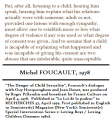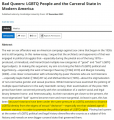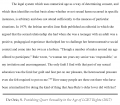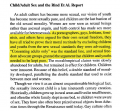Child sexual repression refers to the prevention, through either subtle or overt methods, of children from fulfilling their erotic capacities. Other sources are available on PRD.
For cogent criticism of the broader discourse of sexual repression, see Michel Foucault and associated articles.
Academic perspectives
- Prescott, J.W. (1975). "Body Pleasure and The Origins of Violence," in The Futurist and The Bulletin of The Atomic Scientists.
- Prescott links deprivation of physical affection in childhood to the eventual development of violent and aggressive behaviors. He examines various cultures, and finds that high levels of violence are strongly correlated with repression of extramarital sexual activity.
- Sagan, C. (1980). "Who Speaks For Earth".
- "Mammals characteristically nuzzle, fondle, hug, caress, pet, groom and love their young, behavior essentially unknown among the reptiles. If it is really true that the R-complex and limbic systems live in an uneasy truce within our skulls and still partake of their ancient predelictions, we might expect affectionate parental indulgence to encourage our mammalian natures, and the absence of physical affection to prod reptilian behavior. There is some evidence that this is the case. In laboratory experiments, Harry and Margaret Harlow found that monkeys raised in cages and physically isolated—even though they could see, hear and smell their simian fellows—developed a range of morose, withdrawn, self-destructive and otherwise abnormal characteristics. In humans the same is observed for children raised without physical affection—usually in institutions—where they are clearly in great pain."
- "The neuropsychologist James W. Prescott has performed a startling cross-cultural statistical analysis of 400 preindustrial societies and found that cultures that lavish physical affection on infants tend to be disinclined to violence. Even societies without notable fondling of infants develop nonviolent adults, provided sexual activity of adolescents is not repressed. Prescott believes that cultures with a predisposition for violence are composed of individuals who have been deprived—during at least one of two critical stages in life, infancy and adolescence—of the pleasures of the body. Where physical affection is encouraged, theft, organized religion and invidious displays of wealth are inconspicuous; where infants are physically punished, there tends to be slavery, frequent killing, torturing, and mutilation of enemies."
- "...the correlations are significant. Prescott writes: ‘The percent likelihood of a society becoming physically violent if it is physically affectionate toward its infants and tolerant of premarital sexual behavior is 2 percent. The probability of this relationship occurring by chance is 125,000 to one. I am not aware of any other developmental variable that has such a high degree of predictive validity.’ Infants hunger for physical affection; adolescents are strongly driven to sexual activity. If youngsters had their way, societies might develop in which adults have little tolerance for aggression, territoriality, ritual and social hierarchy...” / “...child abuse and severe sexual repression are crimes against humanity. More work on this provocative thesis is clearly needed. Meanwhile, we can each make a personal and noncontroversial contribution to the future of the world by hugging our infants tenderly.”
- Nelson, J. A. (1989). "Intergenerational sexual contact: A continuum model of participants and experiences," Journal of Sex Education and Therapy, 15, 3-12.
- "Cultural desexualization and denial of children's normal sexual thoughts and feelings: Many patients who present with sex problems suffer not because they were exposed to early sexual experience but because they were deprived of the natural sexual imprinting that occurs among animals and primitive humans (Harlow & Harlow, 1962). [...] In fact, they cite Kinsey et al. (1953) and Ford and Beach (1951) in suggesting that early sexual experience is often positively correlated with greater adult sexual and interpersonal satisfaction. They quote Prescott (1975) in linking repression of childhood sexuality with higher levels of adult social violence."
- Okami, Paul; Olmstead, Richard; and Abramson, Paul R. (1997). "Sexual experiences in early childhood: 18-year longitudinal data from the UCLA family lifestyles project - University of California, Los Angeles," Journal of Sex Research, 34, 339-347.
- "On the other hand, lack of sex play has been indicted for delaying normal development (Gadpaille, 1981), causing sexual pathology in adulthood (Currier, 1981), or indirectly resulting in social violence, as some have concluded from the work of Prescott (1975, 1979)."
- Körperkontakt: Die Bedeutung der Haut für die Entwicklung des Menschen ("Physical Contact: The Importance of the Skin in Human Development"), by Ashley Montagu for Klett-Cotta (2004)
- The author reports on her extensive research into the many deleterious effects of insufficient physical affection during childhood.
- Yates, A. (2004). "Biologic perspective on early erotic development," Child and Adolescent Psychiatric Clinics of North America, 13(3), pp. 479-496.
- "Societies that permit early sex play are said to have fewer adult sexual dysfunctions and paraphilias [10]. Across various cultures, the custom of punishing children for sexual activity is associated with adult sexual restrictions and abstention from intercourse [11]. Ample skin-to-skin contact between mother and infant is associated with a sexual approach rather than avoidance pattern in adults, whereas restricted skin-to-skin contact is associated with problematic intimacy and warlike or aggressive behavior [12, 13 and 14]."
Other authors
- Rule, Jane. (1979). Teaching sexuality," The Body Politic, June.
- "As a society we are so fearful of sexual initiation we pretend that by ignoring it, it will not take place. What we really want is not to know when or how it does. We no longer frighten our children with threats of insanity and death as results of masturbation. It is, instead, clumped with picking one's nose, belching, farting — something not to be done in public, by implication not to be done by nice people at all — but we give our children enough privacy so that the guilty pleasure can be discovered and practiced not only alone but in the company of other unsupervised children. Children caught may be shamed, the more sexually aggressive children ostracized, but it is not, as it used to be, a cause for brutal retribution. Our embarrassed liberality on this matter does not extend to encounters between children and adults. Though anyone who spends any time with very young children knows that they are aggressively curious about bodies — everyone's bodies — apt to stick a finger not only in another's eye or nose but to reach for a nipple or penis, we pretend that these assaults have nothing to do with sex, are only part of random and innocent activity which can be ignored or distracted. The adult who actively participates in sexual instruction of children — whether the nurse who teaches a child masturbation as a sedative or the adult male who complies with a four-year-old's demand, "Show me your penis" — is simply criminal. Sexual education in this culture, when undertaken at all, is presented impersonally in abstract diagrams, unlike any other teaching of bodily function or domestic habit. Once the breast is unavailable for nourishment and the lap outgrown, sexual pleasure is presented as a far off and nearly mystical reward for years of asexual (or at least secret) behaviour. [...] Sexual play based on the understanding of pleasure can have associated with it as many small courtesies as eating with other people, as much ritual wonder as the most sacred of games. Just as children gradually learn greater autonomy and responsibility in all other aspects of living, so their development in sexuality should be gradual until they come to the choices of commitment in relationships, in parenting, not as sex-starved barbarians willing to barter anything for the experience so long forbidden, not as infantile, gluttonous, guilty and dangerously stupid, but as warm, sexually intelligent human beings. [...] For every child traumatized by overt and brutal sexual treatment, there are many, many more suffering the damage of ignorance and repression which makes masochistic women and sadistic men the norms of our society. [...] If we accepted sexual behaviour between children and adults, we would be far more able to protect our children from abuse and exploitation than we are now. They would be free to tell us, as they can about all kinds of other experience, what is happening to them and to have our sympathy and support instead of our mute and mistrustful terror. There are a thousand specific questions, all hard to answer, but we can't begin dealing with them until our basic attitude changes. Children are sexual, and it is up to us to take responsibility for their real education. They have been exploited and betrayed long enough by our silence."
Cultural perspectives
- !Kung Bushmen (humanity's genetic heritage)
- "If a girl grows up without learning to enjoy sex, she had told me, her mind doesn’t develop normally and she goes around eating grass, like a crazy Herero woman who lived in the area" (Return to Nisa, p.156 -- cited in Growing Up Sexually)
Excerpt Graphic Library
The EGL on Youth Sexuality contains some useful information on this topic. Please feel free to access the full version, save and upload to your favored character-limited social media service.
-
Declining rates of sexual activity among youth (YRBS)
-
Various research on Teen Pregnancy correlational nonsense
-
Sexual Repression - effects on the young
-
Sexual Behavior in youth and its effects
-
Reading on child sexuality
-
Some reading on the effects of intimacy
-
Jane Rule on treatment of youth
-
NCAC: Justification for protecting children from porn has always been moral
-
Lancet Global Health: Maternal mortality by region, and across 144 countries
-
Pregnancy-Related Mortality in the USA from 1998 to 2005
Sociocultural arguments are also somewhat related:
-
Philip Jenkins on "objective" scientific terminology throughout time
-
Gilbert Herdt on the glib reductionism of "pedophile" taxon
-
Chenier - how the "pedophile" concept services mainstream society
-
Ning de Coninck-Smith
[1] on the functions of pedophile-hating
-
Gayle Rubin, in
Thinking Sex
-
Foucault, 1978, philosophical take on consent
-
A Percy Foundation reviewer on Chloë Taylor, and the concept of an "Ideal Victim" who is permitted to speak
-
What Foucault had to say about identity
-
Thorstad on the modern gay movement and undesirability of assimilationism
[2]
-
Thorstad (same article) on similar trends in the modern gay movement
-
De Orio on pressures facing the LGBT Movement
-
De Orio on Queer Identities that don't fit the model of consent
-
De Orio with some observations about the role of Liberals in Sex Offender Panic
-
David M. Halperin warns against "Queer" essentialism in "Saint Foucault: Towards a Gay Hagiography"
-
Harris Mirkin on "consenting adults only" trope among other sexual minorities
-
David Evans on the fragile modern construct of childhood innocence and contrary examples
-
David Evans - further details the cultural underpinnings of childhood innocence
-
David Evans - more on the underpinnings of childhood innocence
-
James Kincaid:
Erotic Innocence
-
Egan and Hawkes - Agency
-
Sex Offender Law Exceptionalism, and a possible reason for it
-
Kinsey is quoted on Sex Offender Exceptionalism in this meme, plus his philosophy on child trauma
-
Rene Guyon (1951) on the curious exceptionalism of sex laws













![Ning de Coninck-Smith[1] on the functions of pedophile-hating](/wiki/images/thumb/FLCYK57XwAI5rBj.png/120px-FLCYK57XwAI5rBj.png)




![Thorstad on the modern gay movement and undesirability of assimilationism[2]](/wiki/images/thumb/20210920_033904.jpg/120px-20210920_033904.jpg)











